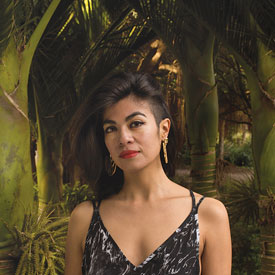“Multiply me when necessary, make me disappear when peremptory. Transform me into light when there is shadow, into a star when in the desert.” — Ingrid Rojas Contreras

Fruit of the Drunken Tree author interview
When do you read, where do you read, how do you read?
I just came back from Colombia with a hammock! I can often be found there in the middle of the afternoon, reading, well, also at night, and who am I kidding, some mornings too.
How do you find new things to read?
When I visit bookstores I often ask booksellers about the last great thing they read. I always end up walking away with a healthy stack.
What helps you get into the writing mood?
A cup of matcha, and putting on one of a rotating set of outfits that are all the same tone of blue.
Do you buy books or borrow books?
I buy books. I hate to borrow books because I am not careful—I drag them to the bathtub, write in the margins, and leave them open face down when I have to pause my reading. Of course, now that I have a hammock, the state of my books has improved.
What are you reading right now/or as the NYT says, What’s on your nightstand?
Ocean Vuong’s On Earth We’re Briefly Gorgeous, Colson Whitehead’s Nickel Boys, and a lot of student work.
Do you have a connection or favorite memory of the public library?
I have loved so many afternoons where I’ve gotten lucky and happened upon an open desk by the big windows overlooking City Hall. It’s the most perfect writing nook.
What was your hardest scene to write?
All of the Petrona chapters near the end of the book were hard to write. I could only write them at night, and they required all I had to offer to put the words down.
Why did you decide to write the book in English?
I just recently wrote about this for the Paris Review. I was thinking about how every day as an immigrant I experienced some kind of language loss. It occurred to me that one of the sacrifices of migration was language. I was working as an interpreter at the time, so I followed a similar process: imagining the story in Spanish, doing an internal translation, and writing it in English. I wanted to make the sacrifice of migration palpable and visible by at the language level.
What was required reading when you were in school in Colombia vs. the required reading in California or the greater United States?
I didn’t experience high school here, so I am not sure! I know we were thrown into the deep waters of literature in Colombia. We read Don Quixote in the seventh grade. We read from the South American canon mostly, and only later in the upper grades did we read European and North American fiction.

